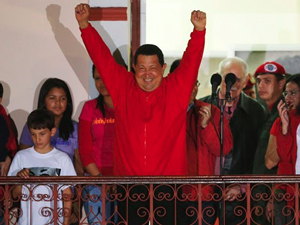
By RT
Incumbent President, Hugo Chavez, has won Venezuela’s tightly-contested presidential elections, clinching a fourth term with over 54 per cent of the vote, according to the National Electoral Council.
With more than 90 per cent of the ballot counted, election officials claim Chavez has won beyond doubt, with rival Henrique Capriles managing just 44,97 per cent of the vote.
“Thank you God! Thank you to everyone,” Chavez said on his Twitter account.
Chavez will take office for a six-year term beginning February 2013.
The election appears to have seen an impressive turnout, with Tibisay Lucena, the National Electoral Council president, stating 81 percent of nearly 19 million registered voters, cast ballots.
Capriles has congratulated Chavez on his victory and told followers not to feel defeated. “We have planted many seeds across Venezuela and I know that these seeds are going to produce many trees,” he told supporters in a speech late Sunday, AP reports.
Joyful crowds of Chavez supporters cheered as the results were announced. Fireworks have been heard around the capital, Caracas. “Absolutely incredible. Everywhere I look fireworks are going off. The city won’t sleep tonight,” RT’s Lucy Kafanov tweeted from the Venezuelan capital.
Some regional leaders have already congratulated the president-elect with Bolivian leader, Evo Morales — a personal friend of Chavez — saying on his Twiiter feed, “Your victory is also ours. It is of South America and the Caribbean. Congratulations President Chavez!” Cuban President Raul Castro was also among the first to congratulate Chavez, the freshly-reelected leader told the audience in a speech.
Addressing to his supporters, Chavez pledged: “Venezuela will never return to neoliberalism, it will continue transition to the democratic socialism of the 21st century!”
The post-election night turned into a big party for Chavez supporters. Some of them went over the top, riding motorbikes and drinking too much alcohol, reports RT’s Lucy Kafanov. Venezuelan riot police have been deployed to prevent possible violence, she says.
Asia Times correspondent Pepe Escobar explained to RT that there are in fact two elections going on in the country. There are “internal Venezuela elections,” he says, and the geo-political ones.
“It is basically urban middle class, which would love to spend more — go to the malls all the time and sip Martinis in Miami like they always do, in fact in Venezuela, against the poor,” he stated. ”Forty-three per cent of Chavez government’s budget goes to social policies. So he has been building in past years a more [egalitarian] society. If you compare this to other countries in the developing world, it is a great achievement.”
“The problem with Chavez is very personalized by the president himself,” Escobar added. “And there is a lot of corruption built in the system. Much of what Capriles is saying is not strictly neo-liberal or right wing, he is neo-liberal right-winger, not exactly a democrat, but what he has been saying about corruption is correct. This is something that happens not only in Venezuela, but in Argentina and Brazil as well. And this opposition between the poor and the middle class that aspire to live like the middle class in Europe or the US, you find the same in Venezuela, Argentina or Brazil. There is class struggle, there is very hardcore all over these important countries in South America.”
Apart from these internal elections there are another elections, he explained, which is “Chavizmo” (as Chavez is called in Venezuela and all over Latin America) against Washington.
Escobar says that the US would love to see Venezuela as it was before Chavez’s years in power. Instead, Chavez’s new presidency will mean a “decrease of power of Washington’s agents or Washington itself in the integration of South America.”
Six candidates competed for the presidency in the current elections, however, since the very beginning opinion polls suggested the race was between just two potential leaders.Incumbent President Hugo Chavez, representing the United Socialist Party of Venezuela, has proven prominent, but opposition candidate Henrique Capriles, representing the Coalition for Democratic Unity, was biting at his heels throughout campaigning. Capriles is the first opposition candidate in Chavez’s 13 years in power. The current leader and his young pro-US rival were neck-and-neck in opinion polls.
Chavez was first elected in 1998 and since then has been waging what he calls a “Bolivarian revolution” towards socialism. He has received a lot of negative coverage from Western media, many regarding him as a reactionary, seeking to cling to power for another presidential term. His controversial foreign policies have provoked the anger of the US on more the one occasion.
He has condemned the support of the opposition in Syria and advocates Iran’s right to enrich uranium. In addition, he has been a key figure in the movement for Latin American integration and the exclusion of the US regarding internal policies.
In contrast, 40-year-old Capriles resolved to radically change Venezuelan foreign policy upon election, heralding a possible strengthening of ties with the US. Born in 1972, Venezuelan politician and lawyer Capriles was mayor of Baruta Municipality of Caracas. Since November 2008 he has been governor of the country’s Miranda state.
Related news:
- From Venezuela; A Message of Solidarity (FCN, 01-01-2007)
- The victory of Venezuela’s Pres. Chavez (FCN, 12-19-2006)
- Venezuelan president says U.S. played key role in ’02 coup attempt (FCN, 03-05-2004)












